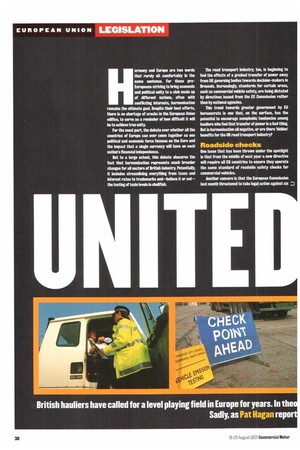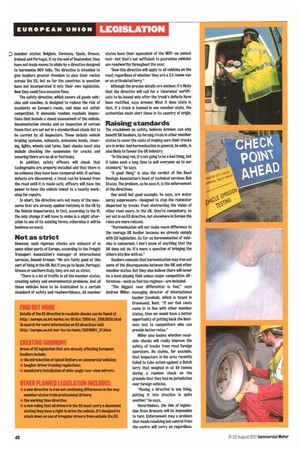H armony and Europe are two words that rarely sit comfortably
Page 38

Page 40

If you've noticed an error in this article please click here to report it so we can fix it.
in the same sentence. For those proEuropeans striving to bring economic and political unity to a club made up of different nations, often with conflicting interests, harmonisation remains the ultimate goal. Despite their best efforts, there is no shortage of cracks in the European Union edifice, to serve as a reminder of how difficult it will be to achieve true unity.
For the most part, the debate over whether all the countries of Europe can ever come together as one political and economic force focuses on the Euro and the impact that a single currency will have on each nation's financial independence.
But to a large extent, this debate obscures the fact that harmonisation represents much broader changes for all sectors of British industry. Potentially, it includes streamlining everything from taxes and interest rates to trademarks and—believe it or not— the testing of toxin levels in shellfish. The road transport industry, too, is beginning to feel the effects of a gradual transfer of power away from UK governing bodies towards decision-makers in Brussels. Increasingly, standards for certain areas, such as commercial vehicle safety, are being dictated by directives issued from the EC Commission rather than by national agencies.
This trend towards greater government by EU bureaucrats is one that, on the surface, has the potential to encourage xenophobic tendencies among hauliers who feel that transfer of power is a bad thing. But is harmonisation all negative, or are there 'hidden' benefits for the UK road transport industry?
Roadside checks
One issue that has been thrown under the spotlight is that from the middle of next year a new directive will require all EU countries to ensure they operate the same standard of roadside safety checks for commercial vehicles.
Another concern is that the European Commission last month threatened to take legal action against six member states: Belgium, Germany, Spain, Greece, Ireland and Portugal, if, by the end of September, they have not made moves to abide by a directive designed to harmonise KV tolls. The directive is intended to give hauliers greater freedom to plan their routes across the EU, but so far the countries in question have not incorporated it into their own legislation. Now they could face massive fines.
The safety directive, which covers all goods vehicles and coaches, is designed to reduce the risk of accidents on Europe's roads, and wipe out unfair competition. It demands random roadside inspections that include a visual assessment of the vehicle, documentation checks and an inspection of certain items that are set out in a standardised check-list to be carried by all inspectors. These include vehicle braking systems, exhausts, emissions levels, steering, lights, wheels and tyres. Spot checks must also include checking the suspension for cracks and ensuring there are no oil or fuel leaks.
In addition, safety officers will check that tachographs are properly installed and that there is no evidence they have been tampered with. If serious defects are discovered, a truck can be banned from the road until it is made safe; officers will have the power to have the vehicle towed to a nearby workshop for repairs.
In short, the directive sets out many of the measures that are already applied routinely in the UK by the Vehicle Inspectorate. In fact, according to the VI, the only change it will have to make is a slight alteration to one of its existing forms, otherwise it will be business as usual.
Not as strict
However, such rigorous checks are unheard of in some other parts of Europe, according to the Freight Transport Association's manager of international services, Donald Armour. "We are fairly good at this sort of thing in the UK. But if you go to Spain, Portugal, Greece or southern Italy, they are not as strict.
'There is a lot of traffic in all the member states, creating safety and environmental problems. And all those vehicles have to be maintained to a certain standard of safety and roadworthiness. All member states have their equivalent of the MOT—an annual test—but that's not sufficient to guarantee vehicles are roadworthy throughout the year.
"Now this directive will apply to all vehicles on the road, regardless of whether they are a 3.5-tonne van or an articulated lorry."
Afthough the precise details are unclean it's likely that the directive will call for a 'clearance' certificate to be issued only after the truck's defects have been rectified, says Armour. What it does state is that, if a truck is banned in one member state, the authorities must alert those in its country of origin.
Raising standards
The crackdown on safety, believes Armour, can only benefit UK hauliers, by forcing rivals in other member states to cover the casts of making sure their trucks are in order. And harrnonisation in general, he adds, is also likely to favour the UK industry.
"In the long run, it's not going to be a bad thing, but it takes such a long time to pull everyone up to our standard," he says.
"A good thing" is also the verdict of the Road Haulage Association's head of technical services Bob Stacey. The problem, as he sees it, is the enforcement of the directives.
One small but good example, he says, are water spray suppressors—designed to stop the rainwater dispersed by trucks from obstructing the vision of other road users. In the UK, they're compulsory, as set out in an EU directive, but elsewhere in Europe the rules are more relaxed.
"Harmonisation will not make much difference to the average UK haulier because we already comply with EU legislation. As far as harmonisation of vehicles is concerned, I don't know of anything that the UK does not do. It's more a question of bringing the others into line with us."
Hauliers concede that harmonisation may iron out some of the discrepancies between the UK and other member states. But they also believe there will never be a level playing field unless major competitive differences—such as fuel tax regimes—are included.
"The biggest cost differential is fuel," says Andrew Miller, managing director of international haulier Eurobulk, which is based in Gravesend, Kent. "If our fuel costs came in to One with other member states, then we would have a better opportunity of getting back the business lost to competitors who can provide better rates."
Miller also doubts whether roadside checks will really improve the safety of trucks from rival foreign operators. He claims, for example, that inspectors in his area recently failed to take action against a Dutch lorry that weighed in at 49 tonnes during a random check on the grounds that they had no jurisdiction over foreign vehicles.
"Having a directive is one thing, putting it into practice is quite another," he says.
Nevertheless, the tide of legislation from Brussels will be impossible to turn. Enforcement may a problem that needs resolving but control from the centre will carry on regardless.
























































































































